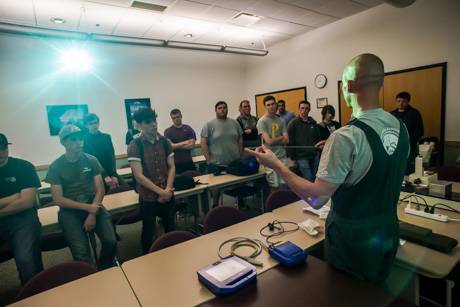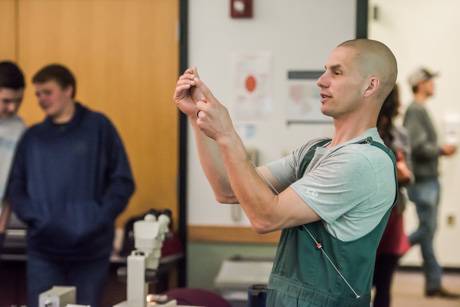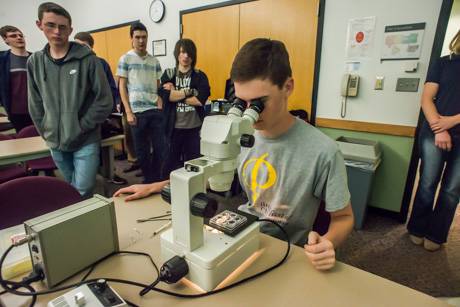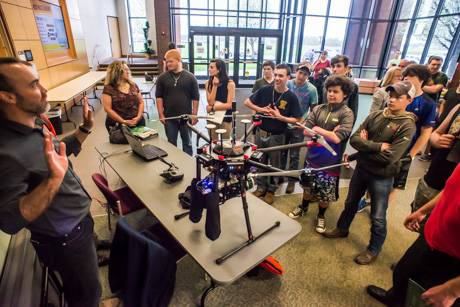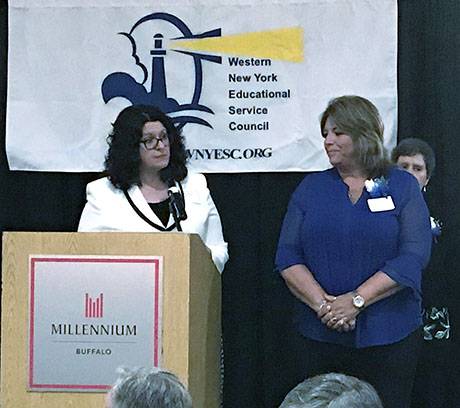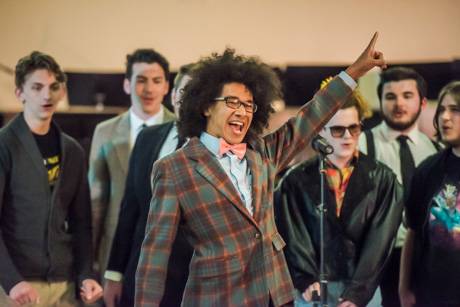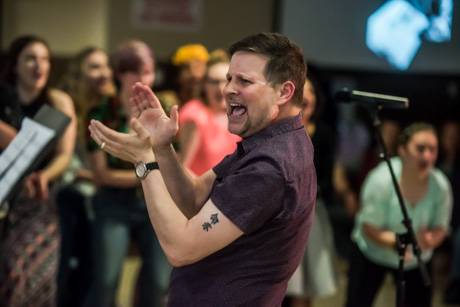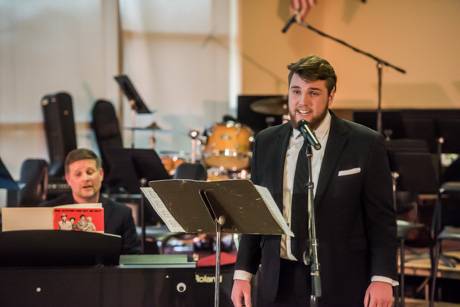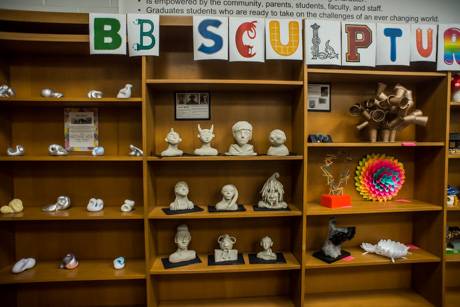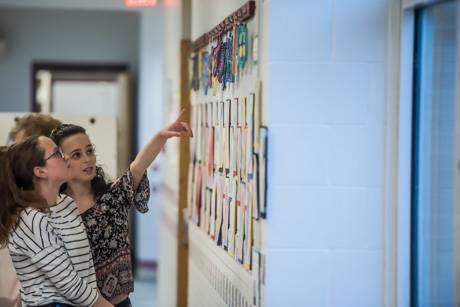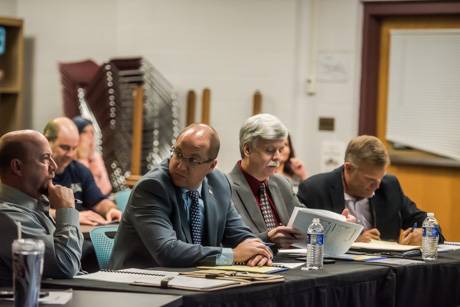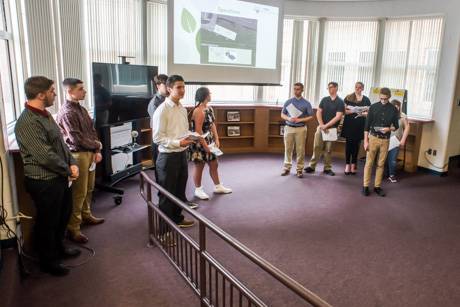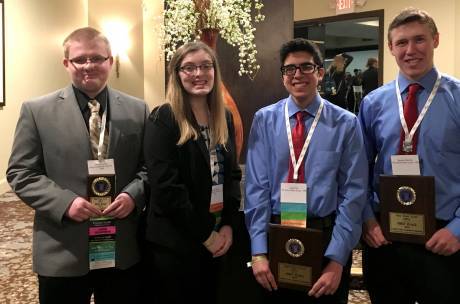Tomorrow voters throughout Genesee County will be asked to cast ballots for school board candidates in our area's eight school districts, although in many cases they will know little about the policy positions of those candidates because of school district restrictions on board member speech.
There are five school districts in Genesee County that bar school board members from publicly sharing their opinions on any school district issues -- Alexander, Byron-Bergen, Le Roy, Oakfield-Alabama, and Pavilion.
As The Batavian found over the past two weeks, these restrictions can even have a chilling effect on candidates who have not yet won a seat on a school board.
The first hint that these policies existed arose on April 23 when members of the Alexander Central School District Board declined to answer questions about policy issues in the district, citing a rule that required all statements to come from the district's superintendent, Catherine Huber, Ed.D.
That prompted an investigation by The Batavian into board member speech policies of all eight school districts in the county. We expected the Alexander policy to be an anomaly. But it isn't.
Five districts clearly prohibit school board members from making any public statements outside of a school board meeting.
School Board Candidate Questions
The Batavian sent five questions to each of the 17 school board candidates who are asking for your votes tomorrow. Only four returned responses.
Alexander Central School:
- Sara Fernaays (Did not respond)
Batavia City Schools:
- Pat Burk (Did not respond)
- Zach Korzelius (Did not respond)
- Shawna Murphy (Did not respond)
Byron-Bergen Central School:
Elba Central School:
- Candy Bezon (Declined to respond)
Le Roy Central School
- William MacKenzie (Did not respond)
- Lloyd Miller (Did not respond)
- Lawrence Bonacquisti (Did not respond)
Oakfield-Alabama Central School:
Pavilion
- John Banister (Did not respond)
- Christopher Jeffres (Did not respond)
Pembroke:
According to legal experts contacted by The Batavian, these policies likely violate the First Amendment rights of those school board members.
Robert Freedman, director of the state's Committee on Open Government, said he's run across these school district prohibitions before and he doesn't believe they would withstand a court challenge.
"Certainly, school board members should not be able to speak on behalf of the school board unless authorized," Freedman said. "But a school board member, like any other citizen of the United States, has the right, and should be encouraged, to speak on matters of public concern."
School board attorney defends speech restrictions
Jennifer Schwartzott, the attorney for the Alexander Central School District, defended her district's policy and said: "It has nothing to do with the First Amendment." She said state and federal law, along with regulations, commissioner’s decisions, and NYS case law support the position that only the superintendent can speak publicly.
NOTE: Jennifer Schwartzott has left a comment on this story and communicated with us via email indicating she does not believe this story accurately represents her views. Please see her comment and our response below.
Schwartzott also represents Byron-Byron Central School District.
Asked for legal citations to support her claim, Schwartzott responded, "I am not going to provide you with free legal advice or do your research for you. The extensive statutory provisions of the Education Law and the corresponding regulations are available online if you wish to review them."
At her suggestion, we looked at articles 31, 35, and 37 of the state's Education Code and couldn't find a single sentence to quote that supports her assertion that state law prohibits school board members from expressing their personal opinions on matters of public interest.
Here's what Schwartzott said about the state law: "The Education Law dictates that boards of education must appoint Superintendents, and the Superintendents shall be 'the chief executive officer[s] of the school district[s],' and 'speak on all matters' on the districts’ behalves."
The question, however, isn't whether board members can individually speak on the district's behalf but whether they can publicly share their own point of view on issues of importance to the district.
New York's education law also says the "superintendent shall be under the direction of the board of education."
At her suggestion, we also searched for case law that supports Schwartzott's assertion that board member speech can be restricted and could find none.
We did find a case that confirms elected officials enjoy First Amendment protection for speech related to their elected duties.
Republican Party of Minn. v. White, for example, states, “The role that elected officials play in our society makes it all the more imperative that they be allowed freely to express themselves on matters of current public importance.”
We also found reference to a case in Arizona where a school board VP was demoted after criticizing the superintendent. A court ruled that the board had a right to pick somebody with opinions better aligned with its own views on policy matters but the former VP was allowed to retain his seat on the board.
We also couldn't find regulations nor commissioner's decisions that support Schwartzott's assertion. We spent hours searching through commissioner's decisions using various search terms and could not find any decisions that indicated school districts could restrict board member speech.
David C. Bloomfield, professor of Education Law at Brooklyn College and The CUNY Grad Center, whom we contacted with the help the Education Law Association, said he knew of no law or case law that prohibited school board members from answering the questions of reporters, or any other member of the public, or otherwise publicly sharing their own personal views on matters of public interest related to his or her school district.
“That’s protected First Amendment speech," Bloomfield said. “Individual board members cannot be prohibited from expressing their opinions publicly on district policies. They are not required to express their opinions but they may express their opinions as a First Amendment matter."
School Taxes
School board members make many decisions each year that affect the lives of local residents, including determining how much we pay in taxes. Here is a sampling of what percentage school districts take in local taxes.
- Alexander CSD in the Town of Alexander: 49 percent.
- City Schools, in the City of Batavia: 47 percent
- Byron-Bergen CSD in the Town of Bergen: 48 percent.
- Byron-Bergen CSD in the Town of Byron: 53 percent.
- Elba CSD in the Town of Elba: 50 percent.
- Le Roy CSD in the Town of Le Roy: 58 percent.
- Oakfield-Alabama CSD in the Town of Oakfield: 50 percent.
- Oakfield-Alabama CSD in the Town of Alabama: 53 percent.
- Pavilion CSD in the Town of Pavilion: 49 percent.
- Pembroke CSD in the Town of Pembroke: 52 percent.
He added, “A school board member can speak about their understanding of school district policies but should be clear they don’t individually speak for the school district. That is properly the responsibility of the board president or superintendent.”
Batavia, Elba, and Pembroke all have more permissive policies than the five districts that have essentially placed a gag rule on school board members.
Candidate questions
To test school board member's understanding of their district's policies on board member speech, we sent five questions to each of the 17 candidates for school board seats in tomorrow's elections. We sent the questions last Monday with a deadline of 5 p.m. Thursday to respond.
We received responses from only five candidates.
Four of those candidates answered the questions (see sidebar).
One candidate, and a current school board member, from Elba, declined to answer the questions even though Elba's policy appears to allow school board members to express individual opinions.
"Thanks for reaching out," said Candy Bezon from Elba CSD. "I think it's great that you're doing that. Being a current Board member, I wish to decline to comment at this time as our current policy is that any media communication should be directed to our Superintendent, Keith Palmer or Board President, Mike Augello. Thank you and I hope you're having a great day."
Palmer shared the district's written policy, which says in part, "The Board President is designated as the spokesperson for the Board when the Board is making a statement on an issue. No other member of the Board individually will speak for, or in the name of, the Board unless by explicit direction of the Board. Board members should emphasize to the media when asked to speak as a board member that they can only speak as a private citizen."
For the 12 candidates who did not respond to the questionnaire, we sent a follow-up request for comment Friday morning (we also sent a reminder email Thursday morning, ahead of the deadline) and inquired as to why they did not respond to the candidate's questions. Not one of the dozen who ignored the candidate's questions acknowledged the follow-up questions.
We actually communicated with one candidate seeking votes, Sara Fernaays, who is unopposed for school board in Alexander, through Facebook messages. She also did not respond. The prior week, The Batavian attempted to interview her after a school board meeting and she declined an interview saying she feared trouble with the school district if she spoke with a reporter.
Policies in Batavia and Pembroke
In our research to uncover specific school board policies for all eight school districts in Genesee County, we first contacted Pat Burk, president of the board for city schools.
Burk said the way he understood New York law, school board members could share their personal opinions but should be clear they are not speaking for the board. They also must be careful not to discuss confidential information, such as information regarding specific students.
There are state and federal laws that protect certain student information (but not all student information) from disclosure.
"They (board members) are allowed to give their opinion but it is only a personal opinion, it is not reflective of the Board," Burk said in an email. "Most Board Members should, of course, say something on an individual issue to the extent of, 'While I feel___________, this is a matter for the entire Board and together we support _____________. I stand by the Board's decision.'
"So with that in mind," he added, "many choose not to speak individually as it really doesn't carry any weight other than it is a personal opinion. I always tend to be pretty open about my personal opinions on school matters as long as they can be discussed, but I am very certain that the person I am speaking to realizes that it is a personal opinion and not the decision of the Board."
We were surprised, then, when Burk, as well as the other two school board candidates (Zach Korzelius and Shawna Murphy) in tomorrow's city schools election, did not respond to our questionnaire. Nor did any of the three acknowledge our follow-up email.
When they failed to respond, we followed up Superintendent Christopher Dailey, who also said school board members were free to express their own opinions on matters related to the school district so long as they protected confidentiality, though it is best to refer questions to a designated spokesperson.
"For District policies and issues that our BOE votes on, the Board practice is to have a spokesperson to share the result of the decision of the Board, if asked by the media," Dailey said.
The other school district in Genesee County that does not restrict board member speech is Pembroke.
Superintendent Matthew Caledron engaged in a transparent and lengthy email exchange with The Batavian about the issue.
Calderon said he believes board members in Pembroke would abide by the policy that questions from a reporter be funneled through the superintiendent; they are not prohibited from sharing their personal opinions on matters before the board.
"I am the official spokesperson, and at Board meetings, it is the Board President," Calderon said. "Individual Board members cannot speak on behalf of the Board or District, and if an individual board members wished to share their personal views with a reporter (or anybody else), while they have the constitutional right to do so, they would probably opt not to do so because most matters are best left to the superintendent or Board President to discuss."
In Calderon's first email response to The Batavian, he pointed us to policy guidelines from the New York School Boards Association that recommends school boards have a designated spokesperson and that individual board members only speak publicly when they make it clear they are expressing their own personal opinion.
From Calderon's email quoting NYSBA policy guidelines:
... when making statements to stakeholders, the public or the media, school board members have a duty to distinguish personal opinion from the established policy or articulated views of the board. Only the board as a whole, or its designee, has authority to speak for the board. Therefore, whenever communicating about issues related to the district, each board member should clearly state that he or she is communicating a personal opinion and is not speaking for the board.
One of the four candidates to answer our candidate's questions is John Cima, school board president, and the only candidate on Pembroke's ballot.
What's interesting about Pembroke's more permissive policy is the law firm Osborn, Reed & Burk LLP represents Pembroke, according to the district's minutes for its 2017-18 organizational meeting. Jennifer Schwartzott, the attorney for Alexander and Byron-Bergen, who has defended the speech restrictions in those districts, is a partner in that Rochester-based law firm.
School districts that restrict speech
Here is an overview of the responses we got when we surveyed school district's on their policies:
Alexander: Their policy was uncovered through prior coverage, which sparked this investigation.
Byron-Bergen: Superintendent Mickey Edwards said "I am the official spokesperson for the District per my contract and Board Policy. 'All statements of the Board will be released through the Office of the Superintendent...' An individual Board member should not make public comment on District matters."
Le Roy: Superintendent Merritt Holley said: "Our Board Policy states #3110, 'All statements of the Board will be released through the Office of the Superintendent and/or District Clerk.' For Le Roy CSD, this policy would direct all statements or questions from the Board to come through my office for publication."
Oakfield-Alabama: Board President Kimberly Staniszewski responded to our inquiry and stated: "All communication is delivered to the media by our school Superintendent or his/her designee. No board member is permitted to speak to the media unless authorized to do so by the Superintendent. I have attached Oakfield-Alabama media policy #3110." The attached copy of policy #3110 is about news releases and is moot on the question of whether board members are entitled to their own publicly shared opinions. Nor does it explicitly direct board members to refer questions to the superintendent. We requested clarification from Staniszewski and did not get a response.
Pavilion: Board President Marirose Ethington responded by quoting the district's policy manual: "As the official spokesperson, the Superintendent or his/her designee shall issue all news releases concerning the District. All statements of the Board will be released through the Office of the Superintendent and/or the District Clerk. Identifying a media spokesperson who will be briefed on all details. This spokesperson shall be the Superintendent or his/her designee. Only this spokesperson shall talk to and maintain a timely flow of information to the media."
Policies elsewhere
The Batavian performed a deep search of online resources to find any legal support for speech-restriction policies and could find none. Where we did find school boards and school board associations that address the issue, the common theme is: School boards should have an official spokesperson and emphasize that school board members are free to answer questions for public review but should emphasize they are speaking for themselves only.
In Ohio, for example, the Ohio School Board Association says: "Dealing with the news media can be intimidating, but responding to journalists is an important responsibility of school board members and administrators."
Stacy Bogard, a public relations specialist advising the Michigan School Boards Association wrote in a column, "you’ll want to do whatever you can to ensure that the media receives openness, honesty, accessibility and trustworthiness from every member of your board and administration."
Even the National School Board Association says that part of a school board member's job is talking with the media.
There have been a couple of attempts we found around the nation of school board members pushing to prohibit other school board members from talking with reporters and in those articles, attorneys and school board associations tend to agree such policies are unconstitutional, such as in New Jersey.
Janet Bamford, a spokesperson for the New Jersey School Boards Association, confirmed in a statement to the Herald on Friday that board members do indeed have that right and do not forfeit their First Amendment rights when serving on a school board.
"Typically boards, as a best practice matter, will designate someone to be the spokesperson for the district, usually the board president and the superintendent," Bamford wrote.
"However, school board members retain their First Amendment rights to comment on anything; however, they must make certain that it is known that they are only speaking for themselves, and not on behalf of the Board of Education."
In Houston, it was school board members who complained that district policies violated their free speech guarantees.
Local government reaction
Over the past two weeks, as we discussed these policies with elected officials in local government, they expressed surprise that such policies existed in local school districts, especially when school districts take such a large chunk of tax revenue from local property owners (see sidebar).
We asked Bob Bauch, chairman of the Genesee County Legislature about it, and he was just as shocked as everybody else and has a hard time believing it's actually true.
“I just can’t imagine a basis for that, if, in fact, it’s true -- that you could possibly tell an elected official they cannot talk to the press, particularly during an election campaign when they’re up for office,” Bausch said.
The way Jennifer Schwartzott, the attorney for Alexander and Byron-Bergen, sees it, school board members speaking at sparsely attended school board meetings should be sufficient for the public to understand their thinking on issues of public interest.
"The Education Law also confirms that in their individual capacities school board members do not have any greater power than other community members," Schwartzott said. "Their power to exercise their board duties arises when they are collectively assembled as a board, as is the case with most boards in municipal and even corporate settings. Community members who are interested in what the local board members have to say can attend board meetings when the members discuss issues, share their opinions, and make decisions."
NOTE: Jennifer Schwartzott has left a comment on this story and communicated with us via email indicating she does not believe this story accurately represents her views. Please see her comment and our response below.
At school board meetings, members of the public, of course, are generally prohibited from entering into a dialogue with board members during board discussions to better probe each member's thinking on issues.
Bausch said he understands the need of reporters to ask questions after a meeting and thinks it is simply part of the process of informing the public.
“If you believe in a free press and public elections, I don’t see how you could possibly say you can’t talk to the press," Bausch said. "I mean, I could say something at Ways and Means that I’m going to vote a certain way and I and the other legislators could all agree and then vote.
"That doesn’t necessarily explain to you in any way what my thinking is on why I voted the way I did. It happens all the time, you could say, ‘I understand your vote but could you explain it to me?’ That’s your job if you’re going to represent yourself as a news person or a reporter or a member of the public.”









